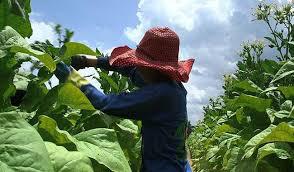
Thirteen-year-old Siti Maryam says she suffers headaches and nausea after harvesting tobacco leaves with her bare hands during four years of working on her family's farm in Indonesia.
Maryam, who is among the thousands of children a rights group says work in hazardous conditions on farms in the world's fifth-biggest producer of tobacco, spoke to Reuters in a field near the east Java city of Probolinggo.
"I feel dizzy, get headaches and feel like vomiting," said Maryam, listing symptoms that match a condition experts call acute nicotine poisoning, or "green tobacco sickness".
Indonesia is one of the world's fastest-growing markets for tobacco products, with about $16 billion of cigarettes sold last year in the country of 250 million, an increase of 13 percent from 2014, says market research firm Euromonitor International.
But a lack of information leaves families oblivious to the risks their children face while working on tobacco farms, said Margaret Wurth, a researcher for New York-based Human Rights Watch.
Several big companies lack procedures to screen out tobacco that involves the effort of children working in hazardous conditions, the group said in a report on Wednesday.
"As a result, these companies risk contributing to the use of, and benefiting from, hazardous child labor," it added.
The group interviewed 227 people, among them 132 children aged between 8 and 17, who said they worked on tobacco farms in four Indonesian provinces.
But the report risks generalizing the whole of Indonesia and some children do work in non-hazardous conditions on tobacco farms, the chairman of the Indonesian tobacco farmers' association, Soeseno, told Reuters.
"The root of the problem is poverty in certain small villages," he said.
Parents getting children to help is in line with cultural norms in some areas, Soeseno, who goes by one name, like many Indonesians, said by telephone.
Source: Reuters
 FR
FR EN
EN AR
AR








